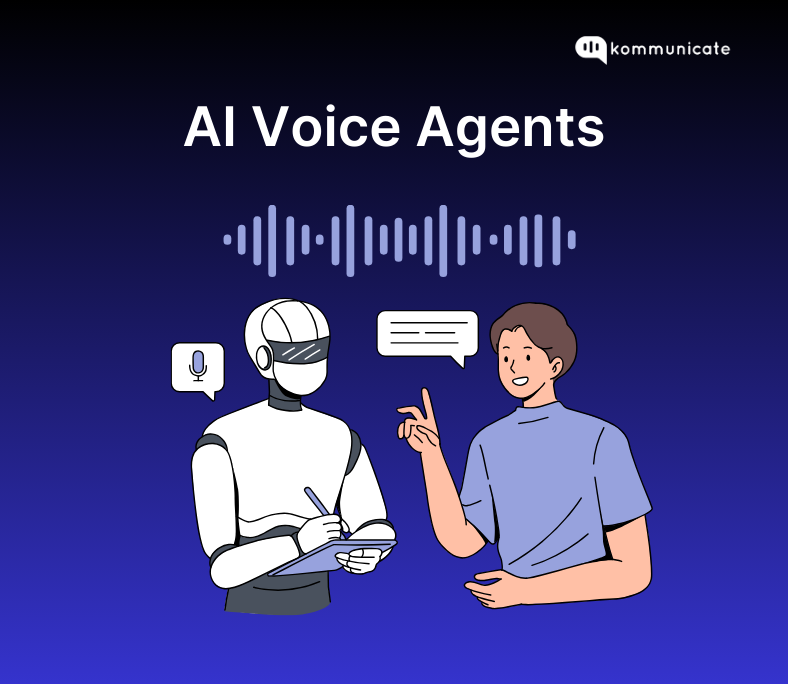An AI voice agent is a virtual assistant that communicates using human-like voice conversations, powered by artificial intelligence. Unlike traditional IVR systems or chatbots, AI voice agents can understand natural speech, process context, and respond dynamically using synthesized voice. These agents are deployed across industries like customer service, healthcare, banking, and smart home technologies, offering real-time assistance with speed and efficiency.

AI voice agents are designed to reduce the need for human intervention in routine voice interactions, improving accessibility and ensuring a smoother customer experience. AI voice agents are commonly integrated into phone systems, mobile apps, websites, and smart speakers.
AI voice agents operate through a multi-step process involving several AI components:
ASR technology listens to the user’s spoken input and converts it into written text. This is the first and most critical step, as the system needs to clearly understand what the user is saying before it can respond accurately. High-quality ASR engines account for various accents, noise levels, and speech speeds.
Once the input is converted to text, NLU analyzes the sentence to determine the intent (what the user wants) and extract relevant entities (such as names, dates, numbers). For example, if a user says, “I want to check my account balance,” the NLU identifies the intent as “check_balance.”
This component manages the flow of the conversation. It considers the user’s intent, the context of previous interactions, and system logic to decide the next response. It ensures the conversation feels natural and coherent.
After deciding on a response, TTS technology converts the text into synthesized speech, enabling the agent to reply in a human-like voice. Modern TTS engines use neural networks to produce natural, emotionally nuanced speech.
AI voice agents often integrate with business systems like CRMs, booking platforms, or databases to perform actions such as looking up customer records, processing transactions, or scheduling appointments.
AI voice agents are available around the clock, ensuring customers can get support anytime without needing human agents to work overnight shifts or holidays. This leads to better customer satisfaction and service reliability.
Unlike human agents, voice agents can handle thousands of interactions simultaneously. This makes it easy to manage high call volumes without increasing staff, especially during peak seasons or product launches.
AI voice agents respond instantly, minimizing wait times and eliminating the need for customers to navigate long phone menus or hold queues.
By automating routine inquiries and transactions, businesses reduce labor costs and free up human agents to focus on complex issues, increasing overall efficiency and reducing customer service costs.
Voice agents can access user history and preferences to deliver personalized responses. For instance, they can greet users by name, reference previous purchases, or suggest relevant services based on past interactions.
AI voice agents can understand and speak multiple languages, allowing businesses to support a global customer base and break language barriers.
Every interaction with an AI voice agent follows the same logic and tone, reducing errors and ensuring that all customers receive the same level of service quality.
Voice agents log all interactions, providing valuable data about customer needs, sentiment, common issues, and service gaps. Businesses can use this data to improve offerings and optimize workflows.
AI voice agents can resolve common support queries such as order tracking, billing questions, or troubleshooting tips. They act as a frontline, handling simple requests before escalating to human agents if needed.
In healthcare, wellness, and service industries, voice agents can schedule, modify, or cancel appointments automatically by integrating with calendar systems.
Telecom providers use voice agents to activate new plans, manage customer accounts, and offer technical support—all without involving a live agent.
Banks deploy voice agents to help customers check balances, get transaction alerts, transfer funds, or inquire about loan eligibility securely and efficiently.
Voice agents assist customers in checking delivery status, locating store hours, initiating returns, or even navigating through product recommendations.
AI voice agents help with booking confirmations, itinerary updates, hotel reservations, and frequently asked travel questions—often reducing stress for travelers.
In smart home environments, users interact with AI voice agents to control lighting, adjust thermostats, lock doors, or get updates on energy usage.
While both AI voice agents and chatbots use AI to automate conversations, they are designed for different types of interactions:
AI voice agents operate through spoken conversations, while chatbots work through written text on websites or messaging apps.
Voice agents are ideal in hands-free scenarios (like while driving or multitasking), whereas chatbots are better in desktop or mobile browsing contexts.
Voice agents often handle more complex, multi-turn conversations with voice cues and natural language. Chatbots are simpler and more transactional.
AI voice agents require advanced tools like ASR and TTS in addition to NLP, making them more technically demanding but also more dynamic.
Voice agents make services more accessible to users with visual impairments, reading difficulties, or those who prefer talking over typing.
AI voice agents are evolving rapidly with advancements in generative AI, emotional intelligence, and real-time personalization. Here's what the future looks like:
Voice agents will soon be able to detect and respond to emotional cues such as frustration or happiness, creating more empathetic experiences.
Deep integration with CRMs, ERPs, and analytics platforms will enable voice agents to handle end-to-end tasks, from onboarding to issue resolution.
With improved language models, agents will offer native-level communication across dozens of languages and dialects, widening global accessibility.
Brands will be able to use custom voices that match their identity, or even offer personalized voices for premium customer experiences.
Beyond customer support, AI voice agents will assist in sales calls, vendor onboarding, employee training, and meeting scheduling.
As AI technology matures, voice agents are expected to become a default interaction method across digital platforms, merging seamlessly into our everyday lives.